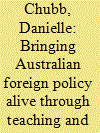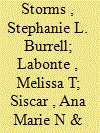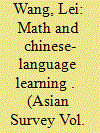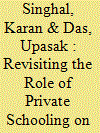|
|
|
Sort Order |
|
|
|
Items / Page
|
|
|
|
|
|
|
| Srl | Item |
| 1 |
ID:
170406


|
|
|
|
|
| Summary/Abstract |
If we are to help students develop opinions and perspectives on world politics, and understand at the same time what it means to hold these opinions and perspectives in the Australian context, we need to bring the world to the classroom. Information overload has led to feelings of alienation among students, and the way we teach needs to instil in students a sense that they are stakeholders in Australian foreign policy, and help them develop strategies for incorporating the complex information environment into their learning. In this short piece I propose two forms of assessment that authentically place the focus on these learning outcomes.
|
|
|
|
|
|
|
|
|
|
|
|
|
|
|
|
| 2 |
ID:
138927


|
|
|
|
|
| Summary/Abstract |
This article examines a multiyear project funded by the Teagle Foundation to assess student learning in humanitarian studies. It explores outcomes derived from developing a collaborative learning approach to humanitarian action that emphasizes both cross-campus and cross-institutional peer-to-peer learning and exchange. Faculty, staff, and students from Fairfield, Fordham, and Georgetown Universities worked together as members of the Jesuit Universities Humanitarian Action Network (JUHAN) to design an innovative and comprehensive assessment process for curricular programs in humanitarian studies, as well as courses with significant humanitarian content. In particular, we focus on the value of establishing cognitive and affective learning objectives, developing tools and methods to assess learning (for example, rubrics and vignettes), demonstrating use of these tools through piloting and data analysis, and closing the assessment “loop.” As the first of its kind assessment strategy for humanitarian studies at the undergraduate level, we argue that these efforts make important inroads in establishing a common baseline for measuring learning in the burgeoning field of humanitarian studies. They also contribute to preparing individuals for futures in the humanitarian profession and to becoming “men and women for and with others.”
|
|
|
|
|
|
|
|
|
|
|
|
|
|
|
|
| 3 |
ID:
160541


|
|
|
|
|
| Summary/Abstract |
After successfully improving access to education in the early 1990s through virtually universal primary school completion and similar positive trends at the senior secondary level in 2005, Indonesia began investing heavily in improving learning outcomes. For almost a decade, the country has been spending about a fifth of its public funds on education. In particular, teachers have received significant salary increases through a certification programme. This paper provides a long-run overview of numeracy and literacy among fifteen-year-old Indonesians using an international test, spanning from 2003 until 2015. It is found that improvements in learning levels are too small to justify the substantial investments that the country has undertaken. The government’s major education policies have not produced the expected results. It is argued that without adding accountability measures that focus on learning outcomes, there is little chance for the investments to provide noteworthy returns in the form of remarkably improved learning outcomes.
|
|
|
|
|
|
|
|
|
|
|
|
|
|
|
|
| 4 |
ID:
161400


|
|
|
|
|
| Summary/Abstract |
This paper seeks to understand the learning outcomes that prevail across key subpopulations in China today. Data from a nationally representative survey show that rural youth are two years behind urban children in math and Chinese. Non-Han minorities, children in poorer counties, and children with less-educated parents are the most vulnerable.
|
|
|
|
|
|
|
|
|
|
|
|
|
|
|
|
| 5 |
ID:
168507


|
|
|
|
|
| Summary/Abstract |
In the view of increasing preference of private schooling in India, this article assesses its impact on learning outcomes for rural children from 8 to 11 years. Despite earlier attempts to study the issue, this article stands out in two ways. Firstly, it addresses the problems arising because of non-random selection of children attending private schools. Secondly, it also presents an all-India estimate unlike most studies which have dealt largely with few states. Our results show the performance of children attending private school to be significantly better than those from public schools. This difference is evident among ‘low-fee’ private schools as well. However the private schooling premium differ across regions and groups, and there are several other concerns regarding affordability, access and segregation which require further deliberation and debate.
|
|
|
|
|
|
|
|
|
|
|
|
|
|
|
|
|
|
|
|
|